Gateway NV58 (Intel) - OS Benchmarks
Wrapping up our look at OS performance on the NV58, we have our OS boot/shut down, hibernate/resume, and sleep/wake test results. As with the NV52, there was a fair amount of variability between test runs. We took the best result of numerous runs for each OS. Once more, note that Windows XP will have an advantage in the hibernate/resume testing because we are using a 32-bit OS (3GB addressable RAM) instead of a 64-bit OS (4GB addressable RAM). No OS wins - or loses - in every single category, but Windows XP and Win7 are usually near the top and Ubuntu and Vista are near the bottom.
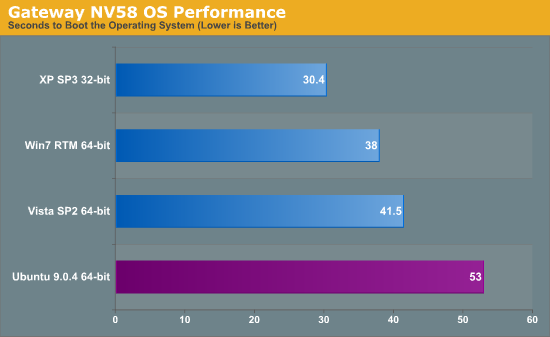
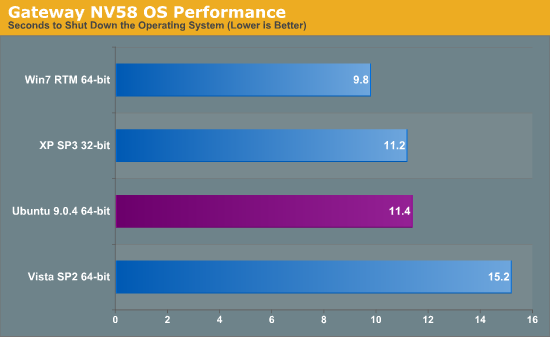
XP loads the fastest once again, this time leading the competition by a larger margin than on the NV52. Windows 7 takes 25% longer to boot, Vista takes 36% longer, and Ubuntu is in last at 74% longer than XP. The GRUB delay is a large portion of the poor showing for Ubuntu, though; it would be very close to the Vista result without the extra ~10 seconds. Shut down times new Windows 7 into the lead, with XP and Ubuntu essentially tied at around 15% longer than Vista bringing up the rear taking 55% longer than Win7.
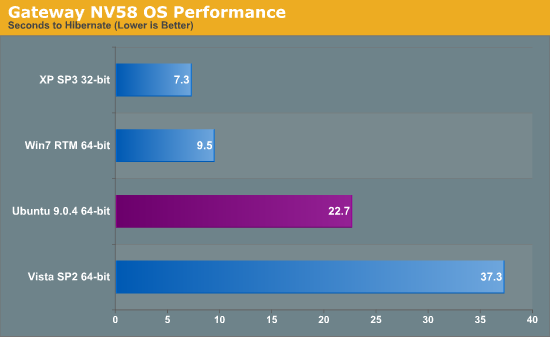
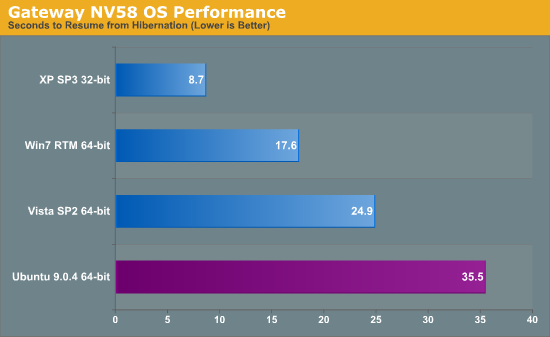
As expected, Windows XP leads in hibernate/resume times since it doesn't have to deal with as large of a hibernation file. Windows 7 trails XP in hibernate times by 30%, correlating very well with the difference in addressable memory. Ubuntu is in third place, requiring over three times as long to hibernate as XP (211% longer). The Vista result is the worst by far, taking 411% longer than XP. There's again the question of whether drivers are somehow at fault, but whatever the cause the NV58 took substantially longer to hibernate on Vista every single time. Resume times don't change the standings much, except Windows XP holds an even larger lead and takes less than half as long as the next closest competitor, Windows 7, which requires 102% more time. Windows Vista doesn't do as poorly in the resume times, though it still trails XP by 186%. Ubuntu is in last place taking just over four times as long to resume as XP, but again the 10 second GRUB penalty is at play.
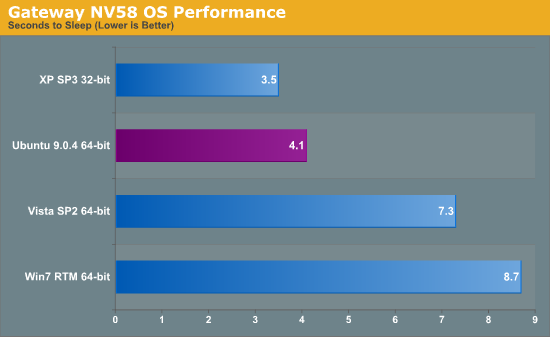
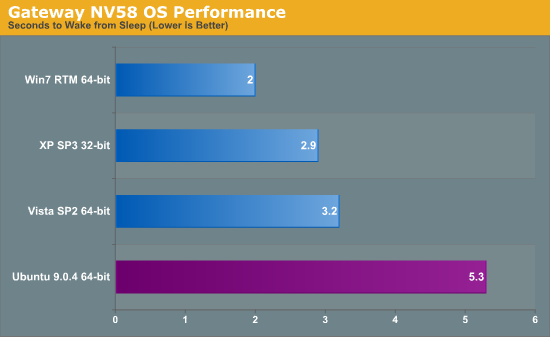
Finally, in sleep times Windows XP again leads, this time followed by Ubuntu which is very close at only 17% longer. Vista takes 109% longer than XP and for once Windows 7 brings up the rear requiring 149% longer than XP to go to sleep. Interestingly, Win7 is the fastest when it comes to waking, requiring just 2 seconds. XP and Vista are 45% and 60% longer, but they're both only around three seconds. Ubuntu is last taking 165% longer than Windows 7, with a result of 5.3 seconds. Since we're dealing with such short times with sleep/wake cycles, the raw percentages and charts aren't nearly as meaningful. As mentioned before, Ubuntu and Win7 tend to be a little more consistent, whereas the best-case results for XP and Vista can be an order of magnitude faster than the worst-case results. If nothing else, Ubuntu is very consistent at going to sleep in around 5-10 seconds; Windows 7 sleep times range from just under 9 seconds up to around 30 seconds, and XP and Vista can take over a minute to go to sleep at times. The difference between 5 seconds and 10 seconds is somewhat annoying, but it's not a huge issue unless you're putting your system to sleep constantly. Occasional delays of over a minute on the other hand can be truly frustrating. For what it's worth, toss in an SSD and the sleep/wake times all appear to be far more consistent (though we didn't conduct in-depth testing on either of these notebooks with SSDs).










106 Comments
View All Comments
Kibbles - Tuesday, September 22, 2009 - link
If all you have is a killawhat meter then that'll be pretty inaccurate. Not just because of the 1W accuracy but also measuing at the outlet you are also including the inefficiency of the powersupply.However I do agree that using the battery is throwing an extra variable into your equation. How big is it? I don't know. But I do know they don't always charge to the same capacity, and their capacity changes overtime.
I don't know if it's possible, but I would think the best option would be to have a DC source modded into the battery connection. Then measure the #W-h used. You would probably need a good variable DC supply and voltmeter to do this (maybe borrow it from the powersupply setting team?). Even then I don't know if you can do that, I think my laptop has like 6 pins on the battery. There's probably some connection for charging, some for battery status, and then the discharge connections.
The second option I see is putting a voltmeter on the DC-out side of the powersupply going into the laptop. You could run the benchmark without the battery for an equivalent duration and see if the W-h is close.
n0nsense - Tuesday, September 22, 2009 - link
Power savings in Ubuntu are far from optimal.I was more than surprised to see that even very basic features may or may not work.
For example on my Gentoo box each core frequency scaled separately.
On Ubuntu some processors are not supported. After all I thought that engineers at Canonical have better kernel understanding than me.
As for the tests, dim option is helping with battery life.
I don't remember such difference in battery life from my experience. Both Linux and windows where capable of ~3Hr on my laptop.
From my very personal point of view, Ubuntu is sluggish. I compared Ubuntu, XP, 7, Debian and Gentoo performance on IBM X31 with 1GB ram.
It started without Gentoo (It takes a while to setup fully optimized Gentoo box). Ubuntu and 7 where (IMHO only)the slowest. Debian and XP where just fine. But since I wanted more, i did the Gentoo thing. It was more than worth it.
With Ubuntu it was overall sluggish feeling (some tests will show much better performance under it than in windows). But feeling is important when you use something. Even more important than some numbers.
7 ... Same sluggish Vista with facelift and few tweaks that can be manually done.
Watching icons drawn few seconds after menu displayed was more than enough. It is more stable, can work longer without reboots, but nowhere faster than XP.
Debian with Gnome was nice so was XP. Anyway I'd stay with Linux since it's more customizable and have few useful things that make me feel handicapped in Windows.
Gentoo once again convinced me that it worth each second (it took more than 2 days on X31. should be much faster on any dual/quad core CPU and/or using distcc). But, not everyone can do it. Even "experienced" Ubuntu/Fedora/Suse (or whatever mainstream distro) may find that his understanding of "how staff works" is not on the required level.
Anyway it's quiet a change to see Linux participating in review.
Good job guys :)
lordmetroid - Tuesday, September 22, 2009 - link
I'll be running Arch Linux on my nettop, I tried gentoo 4 years ago from stage 1 and that was a nightmare to get installed. Maybe I should try it again but Arch Linux seems to be more interesting at this point as it had many of the packages I want in its repositories that I couldn't find in gentoo.stmok - Tuesday, September 22, 2009 - link
Running Arch Linux here on my ThinkPad T43...Much better than Ubuntu.Ubuntu feels bloated. Heck, even Xubuntu feels bloated.
void2 - Tuesday, September 22, 2009 - link
30..40 seconds to boot WinXP on modern CPU? That's sad. I get 7..8 seconds (boot menu to desktop, add your machine POST time yourself) on a comparable CPU (Athlon 64 X2 3800+). Clean OS, no SSD, no messing around with disabling services etc. How? Use Boot Cooler (www.bootcooler.com). It is free.lyeoh - Tuesday, September 22, 2009 - link
Why should anyone use bootcooler? The website doesn't even say what the program is _supposed_ to do, and how it achieves it. I don't see much on the web that describes or tests what it _actually_ does (as opposed to just claims), the limitations etc.It could be a trojan for all we know.
void2 - Tuesday, September 22, 2009 - link
If you haven't noticed, the website is under construction. Detailed explanation of how Boot Cooler works is included in readme.txt (in short - disk reads prefetching). And of course there are no reviews yet - the project is still in beta.orionmgomg - Tuesday, September 22, 2009 - link
I love antech - waiting for the radeon hd 5870 info to hit - looking at this artical - something about your battery lasting longer on your lap top...WHO CARES!!!
Give me a brake - you spend so much time on analizing minutes of extra juice it a fly is in the room or not! WHO CARES?
Plug your lap top in the wall - dont expect it to last any longer than it does when you have a full charge and it runs out of juice.
Once you know how long it lasts - realize your screwed - or should I say attached to the power cord!
Oh - did I mention - who cares?
Thanks for all your other articals!
orionmgomg - Tuesday, September 22, 2009 - link
I love Anandtech*^JarredWalton - Tuesday, September 22, 2009 - link
If you haven't figured it out, I'm the mobile reviewer at AnandTech, and my articles are about mobility. Writing articles about laptops doesn't mean I'm delaying any CPU or GPU reviews -- unless they happen to be mobile CPUs/GPUs. If you don't care about laptops, you don't need to read most of my articles, but please don't make the mistake of assuming no one cares. When people use a laptop on the road and don't have a chance to plug in, articles like this are very useful. If you never use a laptop, great; some people do and that's my target audience.